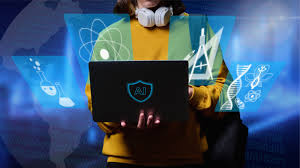Nigerian students are increasingly turning to artificial intelligence (AI) to support their education, according to new Google Search trend data released on Tuesday as schools reopened across the country. The findings highlight a major shift in how young people are engaging with technology, using AI not only for answers but also as a learning partner in subjects ranging from mathematics to chemistry and languages.
Google reported that searches combining “AI + studying” rose by more than 200 percent compared with 2024, a clear sign that learners are becoming more curious about AI and its potential to aid their studies. The company noted that students were actively searching for AI tutors, free educational tools, and specific prompts to guide their work across a variety of academic fields.
The breakdown of the data showed that interest in “AI + chemistry” rose by 50 percent, while queries related to “AI + maths” and “AI + languages” each increased by 30 percent. Searches linking AI to grammar also saw a 20 percent rise. Some of the most common questions included: “What is the best AI in the world for solving mathematical problems?” and “How to use AI to solve math problems?”
Google’s West Africa Director, Mr. Olumide Balogun, said the trend revealed that Nigerian students were embracing AI as more than just a shortcut to answers. According to him, learners are beginning to use the technology to deepen their understanding of complex subjects and sharpen their problem-solving skills. He added that Google remained committed to providing tools that would empower students to learn, grow, and succeed in a rapidly changing world.
The company also observed that interest in AI was spreading beyond schoolwork. General searches such as “how to use AI” and “what is the full meaning of AI” rose by 80 percent, while queries like “who is the father of AI” increased by 70 percent. At the same time, searches for “AI detection” spiked by 290 percent, reflecting growing conversations about responsible AI use, plagiarism, and academic integrity.
Beyond academics, Google said Nigerian youth were also exploring AI for career advancement. “Generative AI” was identified as one of the fastest-rising search terms over the past year, often linked with “professional certification.” This, according to analysts, suggests that young Nigerians are not only preparing to use AI for school projects but are also positioning themselves for the future workforce by seeking out professional training and skills in the field.
The data also showed that overall AI-related searches in Nigeria hit an all-time high in 2025, rising 60 percent compared to the previous year. Experts say this surge demonstrates the growing interest among Nigerians in understanding how AI can be applied across different sectors, from education and business to healthcare and entertainment.
Mr. Balogun noted that the trend placed Nigeria among the leading countries in Africa where AI adoption is being driven by youth curiosity and innovation. He said the technology had the potential to redefine how students learn, adding that its responsible use could prepare young people for opportunities in the global economy.
Education stakeholders believe the trend could have far-reaching effects. With more students using AI-powered platforms, there is potential for improvements in performance and wider access to learning resources. However, concerns remain about overdependence on the technology and its possible misuse in academic work. This is why searches around “AI detection” and responsible use are also on the rise, reflecting an ongoing conversation about striking a balance between innovation and integrity.
Analysts say the development mirrors a global trend where AI tools are being integrated into classrooms, tutoring platforms, and professional training. In Nigeria, where challenges such as overcrowded classrooms and limited access to teachers persist, the adoption of AI could provide students with alternative ways to learn more effectively.
As AI continues to spread, experts insist that the key will be ensuring that learners use the tools responsibly. For now, the growing reliance on AI by Nigerian students signals a major shift in the country’s education sector and highlights the role of technology in shaping the next generation of workers and innovators.
